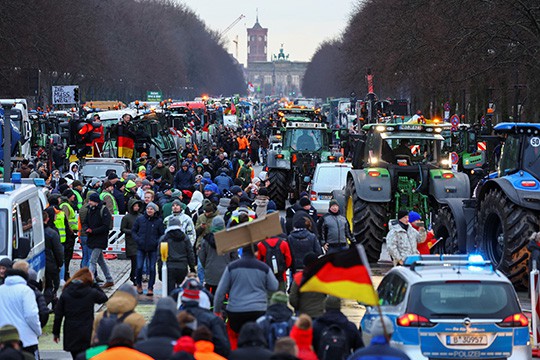Berlin. Irate farmers have blocked roads nationwide in recent days.
For much of its postwar history, Germany was a beacon of prosperity and political stability. Now its economy is stagnating, and social harmony has given way to acrimony and division, notes Bloomberg.
Germany’s grossly unequal distribution of wealth is an underappreciated cause of this malaise: The top 10% of households have at least €725,000 ($793,000) of net assets and control more than half of the country’s wealth, while the bottom 40% of households have at most €44,000 of net assets, according to a Bundesbank survey in 2021.
Together with a pervasive sense that Germany is coming unstuck — think creaking infrastructure, inflation and the loss of cheap Russian gas — economic precarity makes Germans susceptible to fringe arguments that their living standards are threatened and the government is out of touch. In the long term, Europe’s biggest economy must reform its labor-penalizing tax system and promote a broader distribution of capital.
Irate farmers have blocked roads nationwide in recent days, ostensibly to protest agricultural subsidy cuts. They have been joined by supporters of the far-right Alternative for Germany (AfD) who blame the country’s welcome of migrants for its fiscal and economic woes. Almost one-quarter of the population say they would vote AfD if an election were held today.
The federal government is in disarray, having been forced last month to find €17 billion of savings in this year’s budget following a constitutional court ruling that its attempt to repurpose unused pandemic funds for climate investments was illegal.
Reconciling the Free Democrats’ anti-borrowing philosophy with the Social Democrats’ commitment to welfare spending and the Greens’ determination to promote decarbonization has led to bickering and compromises that satisfy almost nobody.
Gallows bearing the traffic-light symbol of the three-party coalition have appeared at roadsides, and Germany’s economy minister, Robert Habeck, was blocked from leaving a ferry by an angry crowd.
But the shared prosperity bit is partly a myth: Inequality is high by European standards and median net wealth of around €106,000 is well below the euro-area median of around €150,000.
Much of Germany’s wealth is held by private, family-owned small and medium-sized companies known as the Mittelstand. These are an engine of job creation, but their thrift underpins the current account surpluses Germany is often criticized for, contributing to inequality and suppressing domestic consumption, according to the International Monetary Fund.
For a long time Germany’s booming exports and budget surpluses deflected from these shortcomings, but the weaknesses of its economic model have now become apparent. Output contracted by 0.3% in 2023, according to an official estimate, and the economy might expand by just 0.3% this year, say economists surveyed by Bloomberg.
read more in our Telegram-channel https://t.me/The_International_Affairs

 11:43 19.01.2024 •
11:43 19.01.2024 •























